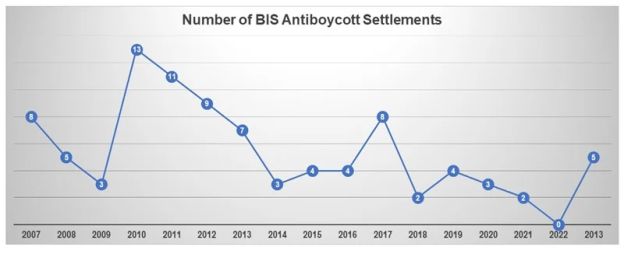- with Senior Company Executives, HR and Finance and Tax Executives
- with readers working within the Accounting & Consultancy industries
In 2022 and 2023, the U.S. Department of Commerce, Bureau of Industry and Security (BIS) announced policy changes signaling enhanced focus on antiboycott enforcement. This year's BIS antiboycott enforcement actions reflect this enhanced focus. We anticipate that BIS will continue to be active in this space. This may be time for U.S. companies and their foreign subsidiaries — especially those conducting business in or involving the Middle East region — to establish, review, and/or update their antiboycott compliance programs.
Brief Overview of U.S. Antiboycott Laws and Regulations
The United States maintains two sets of antiboycott laws and regulations that are designed to counteract U.S. persons' participation in economic boycotts or restrictive trade practices by other countries that are not sanctioned by the U.S. government. BIS administers a set of antiboycott regulations under Part 760 of the U.S. Export Administration Regulations (EAR), while the U.S. Department of the Treasury administers a set of antiboycott laws under Section 999 of the Internal Revenue Code. While the specific requirements under these laws and regulations differ from each other, these laws and regulations generally prohibit and/or penalize U.S. persons from participating in, or cooperating with, unsanctioned international boycotts and also require reporting of certain boycott-related requests.
Violations of the antiboycott regulations administered by BIS may result in public enforcement actions, which may entail civil monetary penalties, denial of export privileges, and/or revocation of existing export licenses. On the other hand, violations of the antiboycott laws administered by U.S. Department of the Treasury may result in negative tax consequences. Willful violations of either sets of antiboycott laws and regulations can also result in criminal monetary penalties and imprisonment.
A primary example of unsanctioned boycott that is the focus of U.S. antiboycott laws and regulations is the Arab League's boycott of Israel. However, U.S. antiboycott laws and regulations could be applied to all foreign boycotts that have not been endorsed by the U.S .government.
Changes to BIS Antiboycott Enforcement Policy
BIS recently issued two memoranda on antiboycott enforcement policy changes. First, on October 6, 2022, Matthew S. Axelrod, the Assistant Secretary for Export Enforcement at BIS, issued a memorandum on "Enhanced Enforcement of the Antiboycott Rules" (October 2022 Memo). The October 2022 Memo outlines BIS's policy changes with respect to antiboycott enforcement, including (1) enhanced penalties; (2) requirement on admission of misconduct in enforcement actions; (3) increased focused on foreign subsidiaries of U.S. companies; and (4) reprioritization of violation categories.
Second, on July 26, 2023, Axelrod issued a memorandum on "Strengthening Antiboycott Reporting and Compliance" (July 2023 Memo). The July 2023 Memo outlines BIS's further measures to enhance its antiboycott enforcement efforts, including by requiring that a boycott request report identify the specific party who made the request. Previously, BIS only required that the report identify the country from which the request originated.
BIS Antiboycott Enforcement Trends
This year's antiboycott enforcement actions reflect BIS's policy changes and its enhanced focus. We discuss antiboycott enforcement trends and key aspects of BIS enforcement actions this year below.
1. Increased Antiboycott Enforcement Activity
According to enforcement data dating back to 2007, which is available on the BIS website, BIS has brought an average of 6.8 enforcement actions between 2007 and 2017. After peaks in 2010 (thirteen settlements) and 2017 (eight settlements), however, the number of BIS's antiboycott enforcement settlements decreased.
This year, we are seeing an uptick in BIS's antiboycott enforcement activities, reflecting BIS's enhanced focus on antiboycott enforcement. To date, there have been five BIS settlements for violations of antiboycott regulations, which is more than double the average number of BIS antiboycott settlements in the preceding five years. We anticipate that BIS will continue to be active in bringing antiboycott enforcement actions.
The below chart shows the number of BIS antiboycott settlements since 2007.

2. Penalties in Cases that Are Voluntarily Disclosed
All five BIS antiboycott settlements in 2023 involved companies that submitted voluntary self-disclosures (VSDs). Nonetheless, BIS decided to impose civil penalties on these companies. In comparison, in the preceding five years, less than half of the antiboycott settlements (or five out of eleven settlements) involved companies that submitted VSDs.
BIS's increased antiboycott enforcement activities in cases involving VSDs may be a reflection of its enhanced focus on antiboycott enforcement. At the same time, however, this may undermine BIS's recent policy announcements encouraging submission of VSDs for violations of the EAR as this may impact companies' risk calculus in deciding whether to file VSDs for potential antiboycott violations.
3. Penalties for Reporting Violations Only
Two of the BIS antiboycott enforcement actions this year only involved reporting violations. That is, companies were required to pay civil penalties for violations falling under Category C (the lowest category in terms of seriousness of the violations under BIS's guidance) even though they did not engage in other more serious violations and filed VSDs.
The imposition of civil penalties for reporting violations only, especially when such violations were voluntarily self-disclosed, has not been common. In the preceding five years, there have been a total of three BIS antiboycott enforcement actions where companies paid civil penalties when failures to report were the only identified violation. In only one of those cases, penalties were assessed even though the company voluntarily self-disclosed the violation.
Reportable boycott requests are often found in fine prints or in general terms and conditions sections of purchase orders, letters of credits, and other transaction documents that may be easy to be overlooked. Reporting violations are also often considered mere "technical" violations. Nevertheless, the 2023 enforcement actions highlight the importance of ensuring that companies establish processes and controls to identify and report boycott related requests.
4. Admission of Misconduct
In line with the policy changes outlined in BIS's October 2022 memorandum, recent antiboycott enforcement actions include the relevant companies' admission of their misconduct. This is in stark difference to past civil settlements which typically did not include parties' admission of the underlying misconduct.
BIS's requirement that parties admit to underlying misconduct may have broader impacts. For example, the admission of underlying misconduct could be used as evidence in shareholder litigations or derivative litigations involving the same underlying misconduct.
5. Enforcement Against Foreign Subsidiary
In 2023, there was one antiboycott settlement with a foreign subsidiary of a U.S. company. Previously, BIS antiboycott enforcement actions generally have focused on U.S. companies that receive boycott related requests. In the October 2022 Memo, however, BIS stated that it intends to "be more aggressive in exploring ways to deter foreign parties from issuing or making boycott requests of U.S. persons," and "bring a renewed focus to [its] enforcement efforts against controlled foreign subsidiaries of U.S. parent companies." Therefore, we expect to see more future enforcement actions against foreign subsidiaries of U.S. companies (in addition to enforcement actions against the U.S. parents).
Conclusion
This year's BIS antiboycott enforcement actions demonstrate BIS's increased focus on antiboycott compliance, which we expect will continue. In particular, the Israel-Hamas conflict could prompt more boycott requests in the region and increase U.S. government scrutiny on compliance with U.S. antiboycott laws and regulations. In addition, with the apparent increase in civil penalties that may be assessed in cases involving more serious violations, and the new requirement for admission of misconduct in antiboycott settlements, the potential cost of antiboycott violations has increased. Therefore, U.S. companies and their foreign subsidiaries — especially those conducting business in, or involving, the Middle East region — may wish to review their existing antiboycott compliance programs. For those that currently do not have antiboycott compliance programs, now may be the time to establish one.
The content of this article is intended to provide a general guide to the subject matter. Specialist advice should be sought about your specific circumstances.


